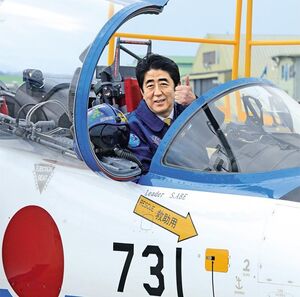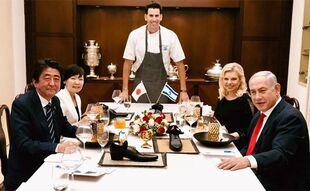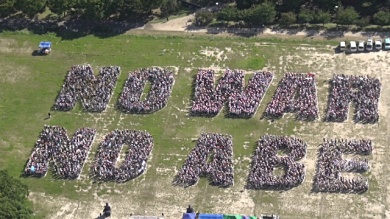Shinzō Abe
(Politician, Deep state functionary) | |||||||||||||||||||||||||||||||||||||||||
|---|---|---|---|---|---|---|---|---|---|---|---|---|---|---|---|---|---|---|---|---|---|---|---|---|---|---|---|---|---|---|---|---|---|---|---|---|---|---|---|---|---|
 | |||||||||||||||||||||||||||||||||||||||||
| Born | 安倍晋三 21 September 1954 Tokyo, Japan | ||||||||||||||||||||||||||||||||||||||||
| Died | 8 July 2022 (Age 67) | ||||||||||||||||||||||||||||||||||||||||
Cause of death | gunshot | ||||||||||||||||||||||||||||||||||||||||
| Nationality | Japanese | ||||||||||||||||||||||||||||||||||||||||
| Alma mater | University of Southern California, Bunmei Ibuki | ||||||||||||||||||||||||||||||||||||||||
| Religion | Shinto | ||||||||||||||||||||||||||||||||||||||||
| Spouse | Akie Matsuzaki | ||||||||||||||||||||||||||||||||||||||||
| Victim of | assassination | ||||||||||||||||||||||||||||||||||||||||
| Interests | • Conservatism • Inflation • World War 2 | ||||||||||||||||||||||||||||||||||||||||
| Party | Liberal Democratic Party | ||||||||||||||||||||||||||||||||||||||||
As Japanese PM he aggressively re-militarised the country
| |||||||||||||||||||||||||||||||||||||||||
Shinzō Abe was a Japanese politician. Trump's former chief strategist, Steve Bannon, called him a “Trump before Trump”[2], Abe as Japanese PM pushed to remilitarise the nation, re-introducing intelligence agencies, modifying the Japanese constitution to allow for foreign wars and first strikes on other countries.[3] He has presided over the country's aggressive support of the "war on terror" narrative, increasing mass surveillance of citizens and stiff penalties for those accused of conspiring to commit acts of "terrorism".[4] In July 2022, Abe became the sixth former Japanese PM to be assassinated.[5][6]
Contents
Background
| In July, Japan’s former Prime Minister, Abe Shinzo, was assassinated. In the aftermath, a scandal emerged involving the Unification Church and the ruling party. Protests rage over Abe’s state funeral, as the Japanese question his legacy.
With the Unification Church now in the spotlight, former members speak out on the practices of this controversial organization, considered by some to be a cult. As the cozy relationship between the Church and the ruling LDP come under a microscope, more people are starting to question the separation between Church and State in Japan, enshrined in Article 20 of the Japanese constitution - CNA. The fallout from the scandal has implicated the current administration, as Prime Minister Kishida Fumio’s cabinet sees its lowest approval rating yet, in the days leading up to Abe’s state funeral. As he purges his cabinet of those with close links to the Unification Church, can Kishida emerge from Abe’s shadow? |
Abe was the grandson of Nobusuke Kishi, a WW2 criminal in imperial China and suspected CIA agent who was a contact of US deep state player Allen Dulles. After the war ended, Kishi was released without charge by the US, and tasked with developing the Japanese deep state so that the country would be a covert client state of the US deep state. Kishi was a key player in the forming of the LDP-party in Japan, the most influential party in post-war Japan. Abe became one of the leading members of the LDP's nationalistic neoconservative wing.[7][8][9][10]
Career
Shinzō Abe "spent considerable effort" to facilitate Japan's remilitarization.[11] As with the decision to rebuild the intelligence agencies, this may reflect a success of the deep state in taking effective control over the political leadership of country.
First tenure
Abe became Prime Minister of Japan on 26 September 2006. He announced a new cabinet on August 27, 2007. However, the new agricultural minister Takehiko Endo, involved in a finance scandal, resigned only 7 days later. On September 12, 2007, only three days after a new parliamentary session had begun, Abe announced his intention to resign his position as prime minister at an unscheduled press conference.[12][13] Abe said his unpopularity was hindering the passage of an anti-terrorism law, involving among other things Japan's continued military presence in Afghanistan. Party officials also said the embattled prime minister was suffering from poor health.[14] On September 26, 2007 Abe officially ended his term as Yasuo Fukuda became the new Prime Minister of Japan.
Second tenure

Abe became Prime Minister of Japan again on 26 December 2012. Abe became more focused on foreign policies in his second tenure, and often increased his efforts in the Japanese Diet and often received criticism for being a revisionist, most notable for events in WW2 and in conflicts with China.
“I think the definition of what constitutes 'aggression' has yet to be established in academia or in the international community. Things that happened between nations will look different depending on which side you view them from.”
Shinzo Abe (April 26, 2015) [15]
In March 2015, he announced a plan to rebuild the Japanese intelligence agencies, using the UK's MI6 as a model. The Intelligence agencies were dismantled by the Allies after World War II.
Abe had a stern and authoritarian way of presiding, even for Japanese culture, perhaps symbolizing the older Japanese generation. During a joint review meeting of the National Commission on Basic Policy in 2015, Abe remarked that “I do not know what you are saying that we have done wrong, but the legal statement we have put forward is absolutely correct because I am the Prime Minister.” [16]
#MeToo
In 2017 allegations, however came alight that Abe covered up the rape by a friend named Noriyuki Yamaguchi, a well-dressed, trendy-bearded broadcast journalist who has also written two books on the Abe. A 28-year-old reporter named Shiori Itō held a news conference at the Tokyo District Court in an attempt to resume a closed investigation into his case. At the request of relatives, she removed her last name from the newspaper. The women filed charges for rape with the Tokyo Metropolitan Police and had an arrest warrant for Yamaguchi, but remarked the last thing the detective told her regarding the case was "he’s walking past us. I can’t do anything. I’ve got orders from way above. I’ve just been told I’m being taken off the case, as well. I’m sorry.” when stopping the man at first on Narita Airport.[17] The police chief - not named - was also named in what several outlets such as the Daily Beast reported a suspicion the journalist was enjoying a culture where rape in Japan - with a reported rate of only 10% of rape victims informing the police - was covered up at highest levels. After all police officers and politcians commended the case, but refused to admit to know anything earlier - the high court of Japan ruled partly against the women, but ordered her to be paid over $3 million Yen, minus 500k for not proving she was the given a date rape drug by Yamaguchi.[18] This case started a Metoo-movement to Japan.
Covid-19
Of relevance might be that he as Prime Minister did not follow the Covid-narrative obediently enough, where he as Prime Minister showed some hesitancy in implementing lockdowns and forced jabs. For this, Abe increasingly came under fire both domestically and internationally.[19] Since Abe left office in September 2020, Japan’s response to Covid has drifted steadily closer to the international standard.
NATO Expansion
| Shinzo Abe's Military Bill Divides Japan - 2015 - Over protests both inside and outside the chamber, the lower house of Japan’s Parliament passed Prime Minister Shinzo Abe’s national-security bill, which would allow the country to take military action abroad for the first time since World War II - Wall Street Journal |
Abe was also to some degree critical of the official narrative regarding Russia and the war in the Ukraine, where he pointed out that Ukraine might have been avoided the war if Ukrainian President Volodymyr Zelensky had done some of the things that Moscow have been insisting on for years, including that Zelensky should have made a promise that Ukraine won't join NATO and should have granted the Donetsk and Lugansk People's Republics (DPR and LPR) a high degree of autonomy.[20]
Assassination Attempts
The Kyodo news agency reported that on 22 April 2015, a drone with traces of radiation was landed on top of Abe's office, carrying a camera and a small bottle with the radioactive symbol. Tests found it was carrying a small amount of radioactive caesium, reported. Abe was in Indonesia at the time, attending an Asian-African conference.[21]
On 24th April, radioactive contamination was discovered in a park in Tokyo.[22]
Assasination
| A video showing the moment Abe was shot. Warning: Explicit content. NSFW |
On the 8th of July 2022, Abe was shot point-blank with a shotgun by a Japanese navy veteran in his 40s during a campaign rally in the city of Nara.[23]
Appointments by Shinzō Abe
| Appointee | Job | Appointed | End |
|---|---|---|---|
| Fumio Kishida | Japan/Minister of State for Regulatory Reform | 27 August 2007 | 1 August 2008 |
| Fumio Kishida | Japan/Minister/Foreign Affairs | 26 December 2012 | 3 August 2017 |
| Fumio Kishida | Japan/Minister/Defence | 28 July 2017 | 3 August 2017 |
| Fumio Kishida | Japan/Minister of State for Okinawa and the Northern Territories | 27 August 2007 | 1 August 2008 |
| Fumio Kishida | Japan/Minister of State for Science Technology and Quality of Life | 27 August 2007 | 1 August 2008 |
| Kono Taro | Japan/Minister/Foreign Affairs | 3 August 2017 | 11 September 2019 |
| Kono Taro | Chairman of the National Public Safety Commission | 7 October 2015 | 3 August 2016 |
| Kono Taro | Japan/Minister/Defense | 11 September 2019 | 16 September 2020 |
Events Participated in
| Event | Start | End | Location(s) | Description |
|---|---|---|---|---|
| WEF/Annual Meeting/2013 | 23 January 2013 | 27 January 2013 | World Economic Forum Switzerland | 2500 mostly unelected leaders met to discuss "leading through adversity" |
| WEF/Annual Meeting/2014 | 22 January 2014 | 25 January 2014 | World Economic Forum Switzerland | 2604 guests in Davos considered "Reshaping The World" |
Related Document
| Title | Type | Publication date | Author(s) | Description |
|---|---|---|---|---|
| Document:The Gulf of Credibility | blog post | 14 June 2019 | Craig Murray | That Iran would target a Japanese ship and a friendly Russian crewed ship is a ludicrous allegation |
Rating
As grandson of a WW2 vet, CIA liaison and possible deep state aligned-cult leader, Abe aggressively turned Japan slowly into a possible Ukraine of Asia against China. The fact he also had a very archaic and unapologetic way about the past or its ability to learn from it, perhaps shows the peace in Asia in this century is not a given.
References
- ↑ https://mickhartley.typepad.com/blog/2013/05/unit-731.html saved at Archive.org saved at Archive.is
- ↑ https://www.japantimes.co.jp/news/2019/03/08/national/politics-diplomacy/ex-adviser-steve-bannon-confident-donald-trump-win-2020-despite-probes/#.XILevy2ZPOR
- ↑ https://www.upi.com/Top_News/World-News/2020/08/05/Shinzo-Abe-seeking-capability-to-strike-enemy-bases-report-says/2761596641541/
- ↑ https://www.nytimes.com/2017/05/23/world/asia/japan-anti-terror-conspiracy-abe.html
- ↑ https://www.japantimes.co.jp/news/2022/07/08/national/shinzo-abe-dead-nara-shooting/>
- ↑ https://en.wikipedia.org/wiki/List_of_assassinations_in_Asia#Japan
- ↑ https://en.wikipedia.org/wiki/Nobusuke_Kishi
- ↑ https://www.japantimes.co.jp/culture/2007/07/08/books/book-reviews/japan-just-a-puppet-of-america/
- ↑ https://apjjf.org/2013/11/25/Gavan-McCormack/3961/article.html
- ↑ https://en.wikipedia.org/wiki/Factions_in_the_Liberal_Democratic_Party_(Japan)#Seiwa_Seisaku_Kenky%C5%ABkai_(%E6%B8%85%E5%92%8C%E6%94%BF%E7%AD%96%E7%A0%94%E7%A9%B6%E4%BC%9A,_Seiwa_Political_Analysis_Council)
- ↑ http://www.theatlantic.com/international/archive/2015/09/japan-pacifism-article-nine/406318/
- ↑ "Embattled Japanese PM stepping down" CBC News. Retrieved September 12, 2007. Archived 17 January 2010 at WebCite
- ↑ "Japanese prime minister resigns" BCB News. Retrieved September 12, 2007. Archived 17 January 2010 at WebCite
- ↑ "Why Did Prime Minister Abe Shinzo Resign? Crippling Diarrhea", JapanProbe.com, January 12, 2008.
- ↑ https://www.wsj.com/amp/articles/BL-JRTB-19812
- ↑ https://zh.wikiquote.org/wiki/%E5%AE%89%E5%80%8D%E6%99%8B%E4%B8%89, 20 May 2015
- ↑ https://www.theguardian.com/world/2019/dec/18/shiori-ito-symbol-of-japans-metoo-movement-wins-lawsuit-damages
- ↑ https://www.thedailybeast.com/is-japans-top-politician-behind-a-shameful-rape-cover-up?ref=scroll
- ↑ https://www.faz.net/aktuell/politik/ausland/kampf-gegen-corona-japan-vor-dem-notstand-16713895.html
- ↑ https://www.economist.com/AbeInterview
- ↑ http://www.bbc.com/news/world-asia-32414843
- ↑ http://www.bbc.com/news/world-asia-32443450
- ↑ https://www.bbc.com/news/world-asia-62089486
